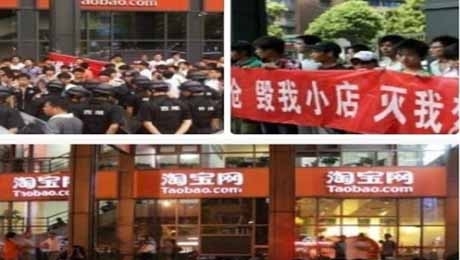

By Yu De (余德)
EO Online
Translated by Zhu Na
Original article: [Chinese]

Close to 50,000 internet "rebels" forced major retailers to suspend sales on Taobao, by flooding the online market place with refund requests and negative comments, in a protest against increased fees that would disadvantage smaller merchants.
The protest spread onto the streets on Wednesday when many of those merchants surrounded the company's headquarters in Hangzhou, calling themselves the “anti-Taobao Alliance”, and describing their cause as a “fight against the landlord”.
Jack Ma, the chairman of Taobao's parent company Alibaba Group, who has complained that his disguntled business partners "are rejecting progress."
What is it that upset them? Taobao on Monday announed an increase of up ten times in the annual fees that it charges merchants, to between 60,000 yuan and 30,000 yuan, compared to the previous 6,000 yuan.
At the same time, Taobao hiked the required deposit from some online merchants from 10,000 yuan to 150,000 yuan.
This isn't the first time that Taobao's merchants have reacted to fee increases with a "riot."
No wonder there's a problem: every time the company increases fees, they make the decision without negotiation and consultation.
You could argue that Taobao, as a private company, is just a business in a free market and can do what it wants.
That's true, but it doesn't justify behaving unfairly, especially from a company whose chairman speaks of quality of service and the credibility of its business partners.
In truth, Alibaba isn't just another business in a free market, it's more like the PetroChina of the Chinese internet.
You might ask, "Where are the other e-commerce enterprises?" The answer is that Taobao has either eliminated them, or is in the process of doing so.
Founded in 2003, Taobao is Asia's largest online marketplace in Asia, with 300 million registered members and transactions totalling 400 billion yuan in 2010.
|
Let’s look back at other incidents involving Taobao: the earliest one was when the company launched its Consumer Protection Plan, at first it was a voluntary fee of 1,000 yuan, then that payment became compulsory, earning the company over two billion yuan. In 2010, Taobao's smaller vendors left their computer screens to surround the company's offices in rage at another new policy - a system for rating merchants that would have shifted their products to the bottom of the ranking making it impossible for them to get buyers' attention. If Taobao sticks with the higher fees announed this week, it will lift the company's revenue by 4 billion yuan. |
No matter how Alibaba tries to dress up changes to its sales policy, each move seems a step away from its mission of “making it easy to do business” as well as its focus on small and medium-sized enterprises.
CORRECTION: An earlier translation of this story incorrectly stated that the Jack Ma had labelled the protesting vendors as "rebels." It also mistakenly said that an earlier policy would have lifted Taobao's revenue by 4 billion yuan, when that figure applied to the policy announced this week.

